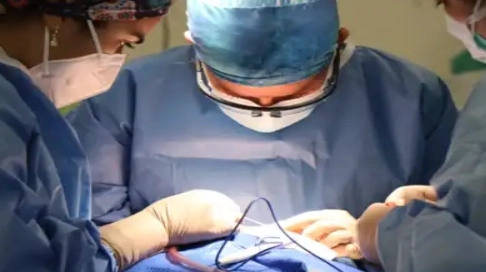
A 31-year-old government employee from Uttar Pradesh, who weighed 254 kg, has undergone a successful weight loss surgery at AIIMS Delhi. The surgery took place on May 30, and he was discharged after recovery on Sunday, as per a TOI report.
Doctors said the man had a Body Mass Index ( BMI) of 75.5, which falls under the category of “super-super obesity.” This condition carries serious health risks, especially during surgery. Experts explained that such cases need special care from many departments, including surgery, dietetics, and psychology.
What is super-super obesity?
Super-super obesity is diagnosed when a person’s BMI goes beyond 60. This level of obesity can lead to many problems, not just health issues like diabetes and high blood pressure, but also emotional and social difficulties. In this case, the man had been gaining weight since childhood. He tried dieting and regular exercise for three years, but could not lose weight.
The surgery and how it works
The surgery was done by Dr Manjunath Maruti Pol and his team at AIIMS. They performed a one-anastomosis gastric bypass, which reduces the size of the stomach and reroutes food directly into the small intestine. This helps regulate hormones, lower blood sugar, and manage conditions like hypertension and high cholesterol.
Dr Pol shared that the patient had lost 90 kg once, nearly 10 years ago, through dieting and exercise. But in the last three years, he gained it back, despite following a strict routine. His weight also affected his job and confidence.
Special care before and after surgery
For such patients, normal weight loss methods are usually not enough. Surgery is the most effective option, but it requires careful planning. Before the operation, the patient was given breathing support for sleep apnea and treated for diabetes and high blood pressure. He also went through physiotherapy and a supervised diet plan.
After the surgery, the patient was kept in a special recovery unit with 24/7 monitoring. Doctors also took steps to prevent blood clots and other complications during and after the operation.
Dr Pol stressed that people with super-super obesity need continuous medical care. Risks like breathing trouble, leakage, and poor nutrition are higher, so expert teams must closely watch their recovery.
-
This crime thriller series with 7.6 IMDb rating is a hit on OTT, every episode has amazing suspense, lead actors are…, series is…

-
This 2-hour 25-minute thriller is a blockbuster with 8.4 IMDb rating, has killer action scenes, hero kills mafia in one night; Movie name is…, actor is…

-
Mumbai Indians lost IPL but Mukesh Ambani still earns Rs 45000000000 from it due to…

-
US vetoes UNSC resolution demanding an immediate Gaza ceasefire

-
Severe Flooding in Assam: Death Toll Rises Amid Continuous Rainfall
